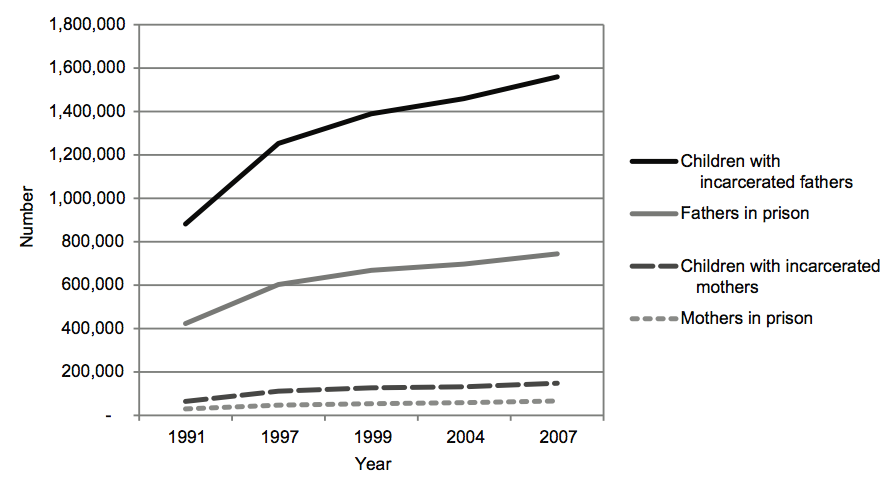America’s incarceration infatuation has crippling consequences for its inmates, but it also devastates their relatives and loved ones—including more than 1.5 million kids who have at least one parent wasting years of parenthood in jail.
A new National Academy of Sciences study reports that the innocent children of jailed parents can become sick, including from mental illnesses; experience hunger and homelessness; start failing at school; and eventually watch helplessly as their once-enamored parents are torn apart.
In 2012, nearly one out of every four prisoners worldwide was an American—some two million people, most black or Hispanic, and often poor, in a country with five percent of the world’s population. In the early ’70s, when state legislatures and Congress began assaulting minority communities with salvos of ruthless sentencing laws, America’s imprisoned population was about 200,000.
Here’s what some of those numbers mean for America’s children:

(Chart: National Academy of Sciences)
“[T]he close correlation between having a partner or parent who has been incarcerated and poor outcomes among families and children is unmistakable,” writes a panel of experts convened by the National Academy of Sciences in a newly released 464-page report following two years of research and meetings.
Buried amid the panel’s avalanche of alarming conclusions was the fact that we don’t really understand what impacts our penchant for incarceration is having on society. And that dearth of scientific knowledge extends to the most innocent victims of all.
“There’s a theme running through our report, which is noting the absence of a research portfolio on this remarkable change in our society,” says Jeremy Travis, the panel’s chairman, and president of John Jay College of Criminal Justice at the City University of New York. “We need to understand, ‘What will be the impacts of high rates of incarceration on children?’ This is noteworthy.”
Despite an absence of a robust body of peer-reviewed research, the panel found “consistent evidence” from “ethnographic and quantitative studies” of the following impacts:
- Women “grow weary” of the “time, energy, and money required to maintain a relationship with an incarcerated partner.” They become emotionally strained, socially excluded, and can feel as though they themselves are being punished by the legal system.
- More than half the fathers in state prisons were found to be primary breadwinners, and financial impacts can continue long after they’re released.
- It’s hard for anybody to raise a child properly, or be a role model, while they’re in jail—especially if their partner refuses to allow the kids to visit that awful place.
- Children of imprisoned parents have problems at school and can become withdrawn, aggressive, and lose trust in adults.
So what can be done to protect families from these effects? “Our overarching recommendation is that there should be fewer people in prison,” Travis says. “If you start there and say, ‘Well, let’s have less family disruption by having fewer people in prison, and try to keep families intact, or at least functioning,’ then that’s a good place to start.”





